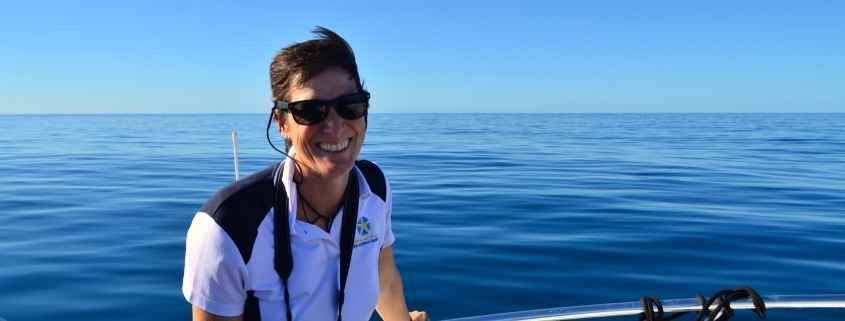Dolphin dreams a reality for WAMSI scientist
On International Women’s Day, March 8, WAMSI Science Coordinator Dr Kelly Waples reflects on her career
As a young girl in beachside California, Kelly Waples dreamt of being a dolphin trainer from the first time she visited a marine aquarium. Her interest soon shifted from spectacle to science but a passion for the marine mammals remained.
Dr Waples, now a Principal Scientist for Department of Biodiversity, Conservation and Attractions and a Science Coordinator for Western Australian Marine Science Institution (WAMSI), ultimately did her doctoral research on rehabilitating and releasing captive dolphins.
“I was always interested in dolphin behaviour, but as I spent more time in the field, I became interested in applying what we learn about these animals to conservation questions,” Dr Waples said.
“The opportunity to work on a dolphin release came up and I jumped at the chance to return to Australia and participate in what was, at the time, a groundbreaking project.”
She described finishing her PhD and moving to Australia as a time when her career hit a crossroads.
“It became clear to me that to pursue a career in marine mammal field biology was not going to be easy or provide much in the way of job security.”
A move to wildlife conservation as a coordinator of wildlife management in New South Wales was ultimately a rewarding opportunity.
“I was responsible for coordinating and advising on a range of issues from nuisance flying foxes and possums to whale strandings and oil spills,” Dr Waples said.
“I was lucky to again have a career change when I returned to Perth and joined the Marine Science Program at DBCA.
“I have more of a science coordination role at WAMSI and have the opportunity to interact with a wide range of scientists from various disciplines to participate in research supporting conservation decisions and to advise on a number of marine mammal issues.”
In her role at WAMSI, Dr Waples is back working on a project involving her first research ‘love’- marine mammals.
“I’ve really enjoyed this last year with the opportunity, through the WAMSI Westport Marine Science Program, to be out in the field in our own backyard here in Perth learning more about the endangered Australian sea lions.”
“I’m learning new skills and working with a wide range of fantastic scientists, veterinarians and marine staff.”
Reflecting on International Women’s Day, Dr Waples said while most of her early mentors and colleagues were male scientists it had been heartening to see that change over time with many amazing and dedicated female scientists joining the ranks.
“I hope that I have done my part (improving the gender balance) by championing young female scientists where I can and giving them the advice and support to choose their paths well.”

